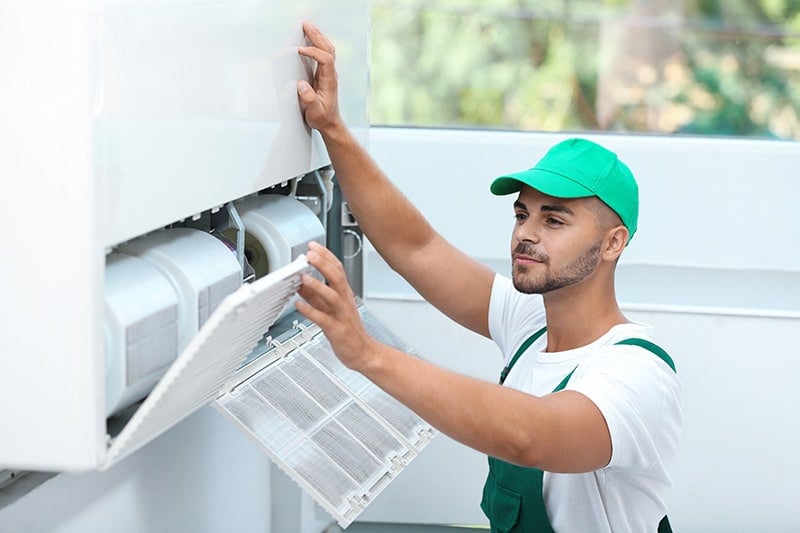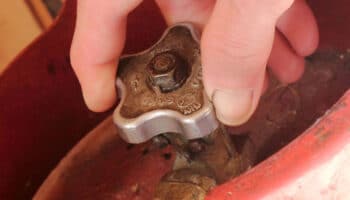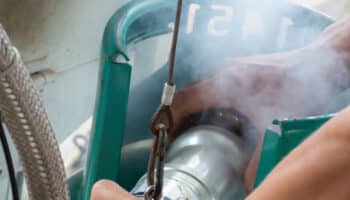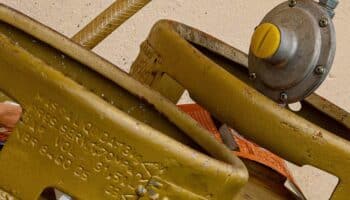We've independently reviewed this article to make sure it's as accurate as we can make it.
To find out more about our article creation and review process, check out our editorial guidelines.
Your kitchen is the heart of your home, and if you love cooking as much as I do, your kitchen sink likely gets the most use out of any other sink in your home.
With all the grease, food leftovers, and gallons of water passing through it daily, it’s no wonder you can hear your kitchen sink gurgle occasionally. But why does your kitchen sink gurgle? Is the gurgling problematic? If so, how can you fix it?
In the following article, we’ll explore all the reasons why your kitchen sink is gurgling and what you can do about it so you never have to put cooking and socializing in the kitchen on pause due to a gurgling sink.
Ready? Let’s go!
Understanding Why Your Kitchen Sink Gurgles
When your sink gurgles but drains fine, more often than not, a food clog is to blame.
In my experience, any time a clog occurs, air gets trapped in the pipe. As the trapped air and gas bubbles attempt to release themselves from the clog, bubbly, and gurgly sounds can ensue.
Your vent pipes, which help release sewer gas, may also be to blame because they’re attached to the drain pipes; gas bubbles can create gurgling sounds when there is an obstruction in the adjacent vent pipes.
It’s important to note that although the pipes allow sewer gas to be released from your plumbing system, they tend to run up into the roof. On the roof, the vent pipes become susceptible to blockages caused by dirt, debris, bugs, and small animals.
Clearing A Slow-Draining Sink
What if your kitchen sink has always drained slowly? A slight debris buildup is likely the culprit. If not addressed properly, the buildup can eventually lead to a full-blown clog.
If you notice your kitchen sink draining more slowly than usual, pour boiling water down the drain. I find that boiling water is a simple fix for minor buildup in the sink, but it won’t be as effective against tougher grime.
Using boiling water is not always recommended. If your pipes are made of plastic (such as PVC), boiling water will soften or melt them. Please make sure your sink, drain and pipes are made of a material that can withstand the high water temperature.
You should also check the garbage disposal. Chances are there are some food and debris accumulations that you can easily clear away by turning on the garbage disposal and running hot water down the drain.
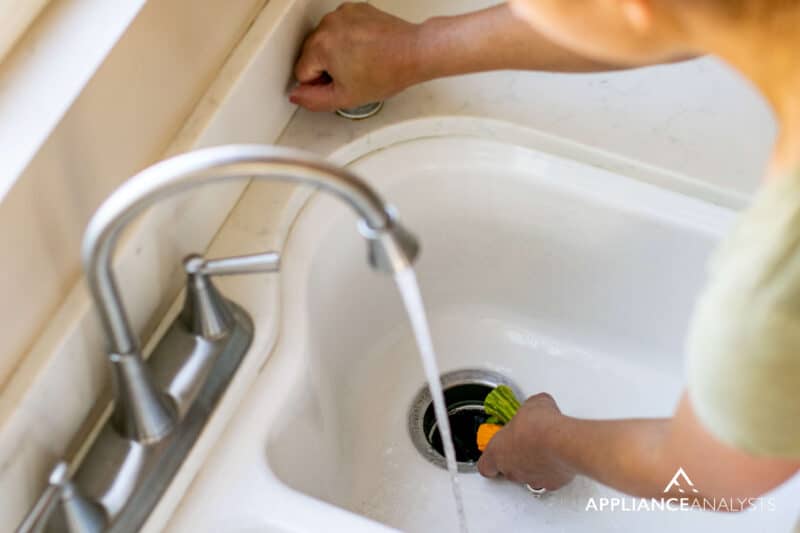
For a kitchen sink that continues to drain slowly, try using a standard sink plunger with a flat bottom to dislodge a stubborn clog.
Fixing A Gurgling Sink
Proper drain maintenance is essential to preventing clogs and can go a long way in improving the situation when your sink gurgles but drains fine. Anything from lint and hair to gunk and grease can obstruct and clog up your pipes if they’re not regularly cleaned and maintained.
My usual advice for dealing with clogs is to use a drain cleaner, but only occasionally, when all else has failed. Drain cleaners can damage your pipes over time, so don’t overuse them.
Choosing the right drain cleaner is a good place to start with your drain maintenance regimen. There are all types of drain cleaners on the market, some chemical-based, others not.
But which is better, and how many different types are there?
Chemical Drain Cleaners vs. Enzyme Drain Cleaners
Chemical drain cleaners are cheap, easy to use, and eliminate clogs faster than enzyme drain cleaners and other natural solutions. However, chemical drain cleaners can produce toxic fumes and pollutants.
If used frequently, Chemical cleaners can cause long-term corrosion and damage to your home’s plumbing system.
Unlike traditional chemical drain cleaners, enzyme drain cleaners contain bacteria that break down waste and debris and eliminate mold and mildew.
From what I’ve seen, enzyme drain cleaners are also safer to use on your plumbing system. However, they’re not as readily available as chemical drain cleaners, and they can also take longer to yield results.
Caution: avoid pouring bacteria killing chemicals like soap, detergent, ammonia, bleach, etc. down the sink if your home has a septic system.
Said cleaners will work in homes connected to the sewer, but when poured into a septic system they’ll kill the bacteria responsible for breaking down solids.
There are also natural alternatives to chemical and enzyme drain cleaners. Some popular homemade drain cleaning solutions include baking soda and vinegar, baking soda and lemon juice, as well as baking soda and salt.
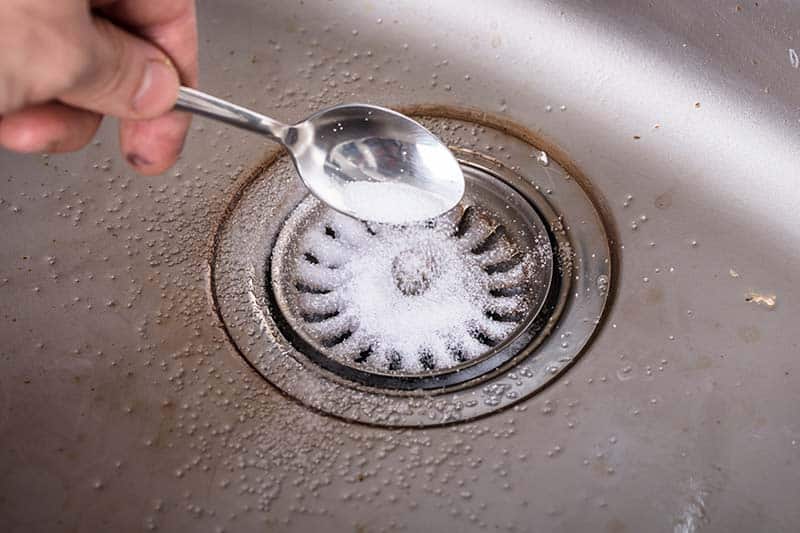
Clean Your Pipes Monthly or Bi-Monthly
Failing to clean your pipes often could also explain why your sink gurgles but drains fine. You may be wondering how often you should clean your pipes – and the answer varies.
Some suggest applying a drain cleaner to your kitchen sink and the rest of your plumbing pipes every one to two months; however, using a drain cleaner so often can be bad for your piping.
A good rule of thumb: Any time your bathtub, kitchen sink, or any other plumbing fixture takes longer to drain, it’s usually a telltale sign that a clog has started to form.
Applying a hefty dose of drain cleaner (usually half a bottle for minor clogs or a full bottle for major clogs), letting it sit, and running hot water will normally do the trick.
However, if your kitchen sink continually experiences clogs and obstructions, professional cleaning and inspection by a plumber may be necessary.
Use Drain Strainers and Run Hot Water After Each Use
A drain strainer can prevent debris from falling into your kitchen sink. You can also use drain grates, filters, and screens in your shower, as well as your bathroom or utility sinks.
Running hot water down your kitchen sink after every use is also a good idea. The hot water can help break and push down grime and other debris that accumulates while you cook or scrub the dishes.
After a particularly heavy-duty cooking session, adding baking soda to your kitchen sink is beneficial after cleaning all your dishes. Let the baking soda sit for a few minutes then rinse with hot water.
You can also do the same with a cup of vinegar and let it sit for up to 30 minutes before adding hot water.
Don’t Dispose of Certain Foods and Substances in Your Kitchen Sink
With a garbage disposal, you can toss anything down the kitchen sink, right?
Think again!
Grease is a big no-no when it comes to disposing of foods down your kitchen sink. Animal fat-based grease, such as bacon grease, is hard to remove and can thicken the walls of the kitchen sink and adjacent pipes.
There’s a whole assortment of foods and items that can easily form blockages. Here are the different types of foods that can cause a kitchen sink clog:
- Coffee grounds
- Eggshells
- Tea leaves
- Rice, pasta, & other starches
- High-fiber foods with skin (artichokes, apples, corn husks, etc.)
Even if you run hot water down the drain after disposing of the abovementioned foods, residue can accumulate over time and create a nasty clog, so it’s better to toss the foods into the garbage before washing the dishes.
Fixing a Gurgling Sink
If your kitchen sink is currently making gurgling sounds but drains fine, now’s the time to take swift action and fix the issue before larger plumbing problems arise.
Which of the methods above will you use to prevent and fix a gurgling kitchen sink? Let us know how they go, and tell us about your experience!
Thanks for reading. If this article was useful and answered your questions, please consider checking out our other resources and free guides below and subscribing to our newsletter.
On the site, you’ll find all sorts of solutions for everyday DIY projects, such as repairing a leaking shower without removing bathroom tiles or removing a stuck deadbolt.
Have a great day!
-Craig.

